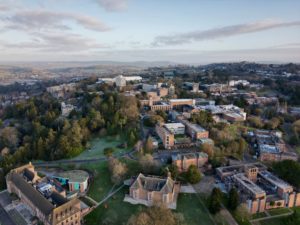Penryn Perspectives: Dr Harry Pitts

“I can honestly say that without this campus, my life would be very different, and I would not be doing what I am doing now.”
Dr Harry Pitts
Dr Harry Pitts is a Senior Lecturer in Politics and Director of Business Engagement & Innovation in the Department of Humanities & Social Sciences at the University of Exeter’s Cornwall Campus, where he is part of the Institute of Cornish Studies. His area of academic expertise encompasses the politics of fairer work futures, with a particular focus on putting local workplace change in wider global context. His commentary on policymaking, political economy and the politics of work has been widely featured and covered in media outlets including The Guardian, The Times, The Economist and The Financial Times. He has also collaborated with organisations across the private, public and third sectors, including multinational corporations, local authorities, trades unions, government agencies, SMEs, social enterprises, think-tanks, pressure groups and policymakers.
In the first in a series of Penryn Perspectives, celebrating the 20th anniversary of the University of Exeter campus in Cornwall, Harry reflects on the very personal difference the campus has made to his life as someone born and bred in the town.
“I am proudly Cornish, with my family having lived and worked in the Penryn and Falmouth area for hundreds and hundreds of years. The product of generations employed in industrial and agricultural occupations, university was not an obvious option for me growing up.
“At school in Penryn, I was aware of the campus springing up out of what was the convent at Tremough, but I never imagined that someday I would study or work in one of those buildings over the fields. Today, I am one of the beneficiaries of a campus whose purpose is to broaden the opportunities available to Cornish kids like me. I almost certainly would not have gone to university and built a career were it not for the campus being established here 20 years ago.
“I was encouraged by some inspirational lecturers to think about applying for a PhD scholarship to pursue my research interest in the politics of working life. Keen to stay close to home I tried and failed to find funding to remain studying in Cornwall but eventually won an award up country, where I spent the best part of the next decade building an academic career. In this sense, the effect the campus had on my life eventually led me to leave Cornwall. But, later, the campus also led me back.
“While enjoying teaching and research in the Business School at the University of Bristol, my aim was always to get back to where I am from. The hard work paid off when I took up my current position at Penryn Campus in January last year. Now I am sitting here in my office at what we once knew as ‘Tremough’. Out of one window, I can see my old secondary school in Penryn. Out of the other window, when the wind blows in the right direction, I can hear the children in the playing field of my old primary school in Mabe.

“This closeness always keeps me focused on using my teaching and research to make a positive impact for the people of Cornwall and contribute to my community. My teaching engages students with the changing face of work and industry in the area, and my research helps local businesses construct a future of good work and good growth for the Duchy. I am also involved with the Civic Universities agenda, which 20 years on from the founding of the campus, reaffirms its original mission of acting as an anchor for Cornwall’s aspirations.
“After A-Levels at Truro College, I took English with Media Studies at Falmouth alongside working a range of part-time jobs. At the time, it was one of the few degrees available on campus that didn’t require any practical artistic ability. After a temporary attempt at fame and fortune with a touring rock’n’roll band, I combined employment with a part-time Masters at the University of Exeter, which had started offering politics degrees on campus.
“Cornwall led the country and the world by providing the natural resources and engineering brilliance that drove the first industrial revolution. Having felt the consequences of deindustrialisation in the years since, Cornwall has an important strategic role to play in leading a new industrial revolution today. With the right foundations in place, there is a real potential for Cornwall to rebalance its economy away from a reliance on certain sectors towards more secure and sustainable livelihoods in industries like maritime, energy and mining.
“This is what gets me up to work in the morning, and motivates my collaborations with colleagues here at the Penryn Campus.”



